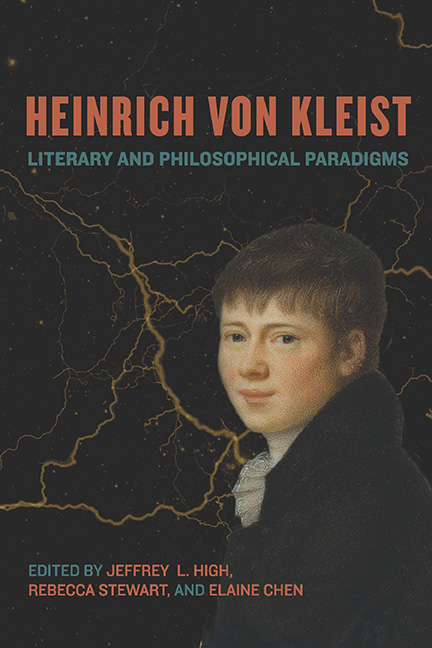9 - War Games: Kleist, Adam Ferguson, and the Cultural Poetics of Play
Published online by Cambridge University Press: 26 May 2022
Summary
HEINRICH VON KLEIST (1777–1811) is a radical political writer—radical in the sense that he seeks to get to the roots of the political by questioning the formation of society and the elementary conditions of its possibility. Kleist's texts—perhaps most vividly, Die Herrmannsschlacht (The Battle of Herrmann, 1808)—present experimental social arrangements: in the fictional settings of his dramas and stories, societies are exposed to a series of extreme situations that are carefully devised in order to make their constitutive elements visible. Kleist shares this endeavor to investigate the elementary conditions of sociality with the political and socio-theoretical discourses of the Enlightenment, which he simultaneously subjects to a profound critique.
Self-Preservation and Society
A dominant approach within Enlightenment philosophy attributes political order to an original social contract. Insofar as scholarship is interested in the theoretical background of Kleist's political thought, it has focused primarily on the representatives of this theory of society, which is oriented toward natural law and contractualism: Thomas Hobbes (1588–1679), Samuel Pufendorf (1632–94), John Locke (1632–1704), Jean-Jacques Rousseau (1712–78), Immanuel Kant (1724–1804), Johann Gottlieb Fichte (1762–1814), and Adam Müller (1779–1829). Within Enlightenment thought, however, there is a second variety of socio-anthropological reflection that is skeptical of the assumption of a social contract. The representatives of this direction—in particular the French thinkers Charles-Louis de Secondat, baron de Montesquieu (1689–1755) and Anne Robert Jacques Turgot (1727–81), as well as the protagonists of the Scottish Enlightenment: Adam Smith (1723–90), David Hume (1711–76), Henry Home (1696–1782), and Adam Ferguson (1723–1816)—do not attribute the emergence of social order to an original act of positive legislation, but to an elementary human sense of community, a “désir de vivre en société” (desire to live in society), from which a corporative “esprit de nation” (spirit of the nation) and certain pre-legal structures of communal living are derived. Here, Society is not based on legalistic and rational grounds, but rather on affectivity.
Kleist's oeuvre shows clear affinities to the second variety of socio-theoretical reflection, that by authors who are skeptical of the notion of social contract.
- Type
- Chapter
- Information
- Heinrich von KleistLiterary and Philosophical Paradigms, pp. 233 - 253Publisher: Boydell & BrewerPrint publication year: 2022

